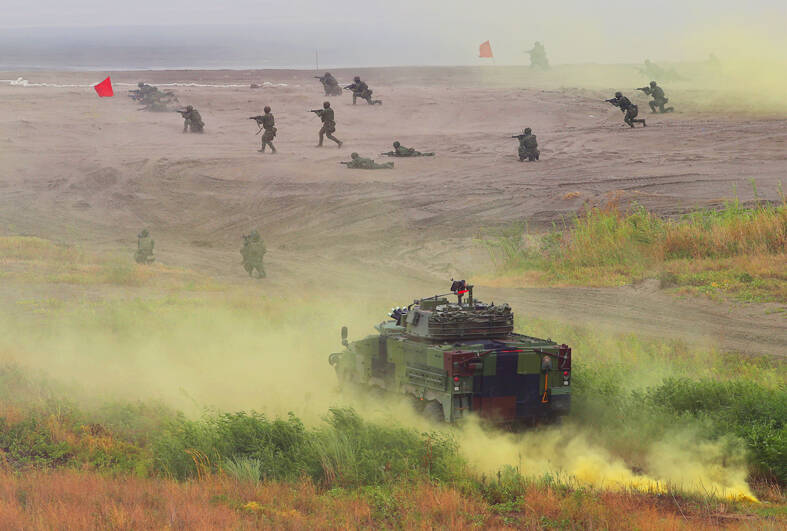Taiwan could receive foreign military financing from the US for the first time if Washington seeks to hasten the process of providing the nation with military equipment, the Financial Times reported on Wednesday.
Citing two people familiar with the plan, the newspaper reported that the US Office of Management and Budget is to include funding for Taiwan in a supplemental request as part of an effort to accelerate the provision of weapons.
The funding would be listed as part of a supplemental budget request for Ukraine that is pending congressional approval, it reported.

Photo: CNA
If passed by the US Congress, Taiwan could for the first time receive arms paid for by US taxpayers.
“The White House is expected to submit the request this month,” the report said.
Asked by reporters about potential foreign military financing, US National Security Council spokesman John Kirby on Thursday declined to comment directly, but reiterated the US’ commitment to furnishing Taiwan with necessary defensive equipment under the Taiwan Relations Act.
Various agencies might implement this commitment and would explore appropriate ways of doing so, Kirby said.
The request comes on the heels of a White House announcement that the US would for the first time supply Taiwan with US$345 million in weapons under a system known as the Presidential Drawdown Authority, which has been used to send weapons to Ukraine.
The Financial Times reported that the decision to include funding for Taiwan in the supplemental budget and to use the drawdown authority underscores rising urgency to help Taipei.
The US National Defense Authorization Act (NDAA) says that the US Congress can empower the US president to allot US$1 billion to provide Taiwan with aid in the form of defensive equipment, education and training.
The NDAA would also allow the US Department of State to provide up to US$2 billion per year in foreign military financing until 2027.
“This would be a monumental step that signals how far the US government is now willing to go to accelerate deterrence across the Taiwan Strait,” said Eric Sayers, managing director of the Washington-based Beacon Global Strategies, an advisory firm.
Additional reporting by CNA

Taiwan is gearing up to celebrate the New Year at events across the country, headlined by the annual countdown and Taipei 101 fireworks display at midnight. Many of the events are to be livesteamed online. See below for lineups and links: Taipei Taipei’s New Year’s Party 2026 is to begin at 7pm and run until 1am, with the theme “Sailing to the Future.” South Korean girl group KARA is headlining the concert at Taipei City Hall Plaza, with additional performances by Amber An (安心亞), Nick Chou (周湯豪), hip-hop trio Nine One One (玖壹壹), Bii (畢書盡), girl group Genblue (幻藍小熊) and more. The festivities are to

Auckland rang in 2026 with a downtown fireworks display launched from New Zealand’s tallest structure, Sky Tower, making it the first major city to greet the new year at a celebration dampened by rain, while crowds in Taipei braved the elements to watch Taipei 101’s display. South Pacific countries are the first to bid farewell to 2025. Clocks struck midnight in Auckland, with a population of 1.7 million, 18 hours before the famous ball was to drop in New York’s Times Square. The five-minute display involved 3,500 fireworks launched from the 240m Sky Tower. Smaller community events were canceled across New Zealand’s

‘IRRESPONSIBLE’: Beijing’s constant disruption of the ‘status quo’ in the Taiwan Strait has damaged peace, stability and security in the Indo-Pacific region, MOFA said The Presidential Office yesterday condemned China’s launch of another military drill around Taiwan, saying such actions are a “unilateral provocation” that destabilizes regional peace and stability. China should immediately stop the irresponsible and provocative actions, Presidential Office spokeswoman Karen Kuo (郭雅慧) said, after the Chinese People’s Liberation Army (PLA) yesterday announced the start of a new round of joint exercises around Taiwan by the army, navy and air force, which it said were approaching “from different directions.” Code-named “Justice Mission 2025,” the exercises would be conducted in the Taiwan Strait and in areas north, southwest, southeast and east of Taiwan

UNDER WAY: The contract for advanced sensor systems would be fulfilled in Florida, and is expected to be completed by June 2031, the Pentagon said Lockheed Martin has been given a contract involving foreign military sales to Taiwan to meet what Washington calls “an urgent operational need” of Taiwan’s air force, the Pentagon said on Wednesday. The contract has a ceiling value of US$328.5 million, with US$157.3 million in foreign military sales funds obligated at the time of award, the Pentagon said in a statement. “This contract provides for the procurement and delivery of 55 Infrared Search and Track Legion Enhanced Sensor Pods, processors, pod containers and processor containers required to meet the urgent operational need of the Taiwan air force,” it said. The contract’s work would be